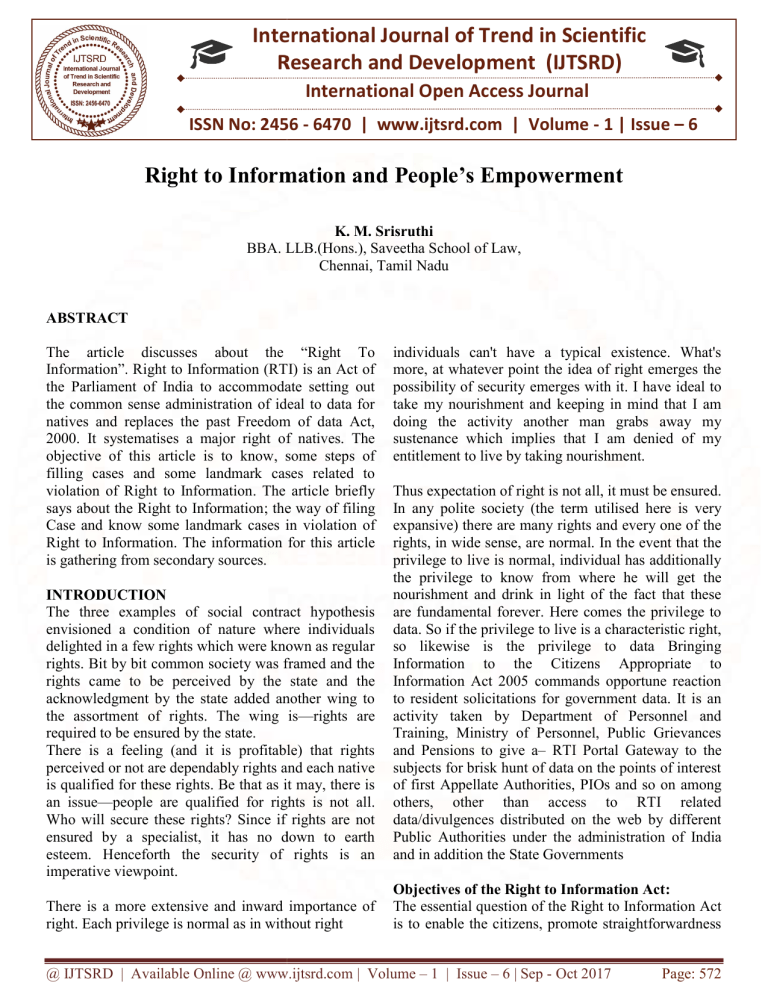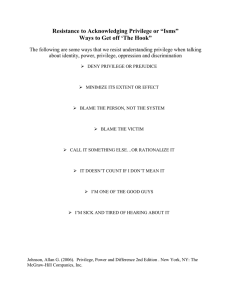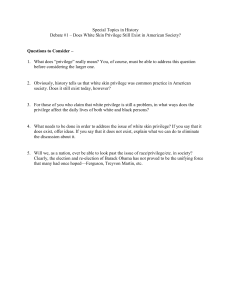Uploaded by
mail
Right to Information & People's Empowerment: An Overview

International Journal of Trend in Scientific Research and Development (IJTSRD) International Open Access Journal ISSN No: 2456 - 6470 | www.ijtsrd.com | Volume - 1 | Issue – 6 Right to Information aand nd People’s Empowerment K. M. Srisruthi BBA. LLB.(Hons.), Saveetha School oof Law, Chennai, Tamil Nadu ABSTRACT The article discusses about the “Right To Information”. Right to Information (RTI) is an Act of the Parliament of India to accommodate setting out the common sense administration of ideal to data for natives and replaces the past Freedom of data Act, 2000. It systematises a major right of natives. The objective of this article is to know,, some steps of filling cases and some landmark cases related to violation of Right to Information.. The article briefly says about the Right to Information;; the way of filing Case ase and know some landmark cases in vi violation of Right to Information.. The information for this article is gathering from secondary sources. INTRODUCTION The three examples of social contract hypothesis envisioned a condition of nature where individuals delighted in a few rights which were known as regular rights. Bit by bit common society was framed and the rights came to be perceived by the state and the acknowledgment by the state added another wing to the assortment of rights. The wing is is—rights are required to be ensured by the state. There is a feeling (and it is profitable) that rights perceived or not are dependably rights and each native is qualified for these rights. Be that as it may, there is an issue—people people are qualified for rights is not al all. Who will secure these rights? Since if rights are not ensured by a specialist, it has no down to earth esteem. Henceforth the security of rights is an imperative viewpoint. There is a more extensive and inward importance of right. Each privilege is normal as in without right individuals can't have a typical existence. What's more, at whatever point the idea of right emerges the possibility of security emerges with it. I have ha ideal to take my nourishment and keeping in mind that I am doing the activity another man grabs away my sustenance which implies that I am denied of my entitlement to live by taking nourishment. Thus expectation of right is not all, it must be ensured. ensure In any polite society (the term utilised here is very expansive) there are many rights and every one of the rights, in wide sense, are normal. In the event that the privilege to live is normal, individual has additionally the privilege to know from where wher he will get the nourishment and drink in light of the fact that these are fundamental forever. Here comes the privilege to data. So if the privilege to live is a characteristic right, so likewise is the privilege to data Bringing Information to the Citizens Citiz Appropriate to Information Act 2005 commands opportune reaction to resident solicitations for government data. It is an activity taken by Department of Personnel and Training, Ministry of Personnel, Public Grievances and Pensions to give a– RTI Portal Gateway to the subjects for brisk hunt of data on the points of interest of first Appellate Authorities, PIOs and so on among others, other than access to RTI related data/divulgences distributed on the web by different Public Authorities under the administration adminis of India and in addition the State Governments Objectives of the Right to Information Act: Act The essential question of the Right to Information Act is to enable the citizens, promote straightforwardness @ IJTSRD | Available Online @ www.ijtsrd.com | Volume – 1 | Issue – 6 | Sep - Oct 2017 Page: 572 International Journal of Trend in Scientific Research and Development (IJTSRD) ISSN: 2456-6470 and responsibility in the working of the Government, contain debasement, and influence our majority rules system to work for the general population in genuine sense. It abandons saying that an educated resident is better prepared to keep important vigil on the instruments of administration and make the administration more responsible to the governed. The Act is a major advance towards making the nationals educated about the exercises of the Government. HOW TO FILE AN RTI PLEA The Act recommends a straightforward system to get data. Despite the fact that some open specialists have their own particular arrangements, there is no impulse to adhere to the endorsed design Stage 1: Identify the division you need data from. A few subjects fall under the domain of State governments or neighbourhood expert, for example, the civil organization / panchayat, while others are taken care of by the Central government Stage 2: On a sheet of white paper, work out the application by hand, or sort it, in English, Hindi or the official dialect of the range. You can likewise ask the general population data officer to explicitly state it Stage 3: Address the application to the State/Central Public Information Officer. Compose the name of the workplace from which you look for data, and the entire, adjust address. Plainly specify 'Looking for data under the RTI Act, 2005' in your title Stage 4: State your demand as particular, nitty gritty inquiries, and specify the period/year your demand falls into. Request records or concentrates of archives, if required. To get reports, the candidate needs to make an installment of Rs. 2 for each page Stage 5: Pay Rs. 10 to document the request this should be possible as money, cash arrange, bank draft or a court expense stamp. The stamp ought to be attached to the application. Candidates beneath the destitution line (BPL) require not make the instalment but rather need to append a duplicate of the BPL endorsement alongside the application Stage 6: Provide your full name and address, contact subtle elements, email address and sign the application plainly. Put in the date and the name of your town Stage 7: Take a photocopy of the application and keep one with you for future reference. Send your application by post or hand it in by and by to the office concerned. Keep in mind to get an affirmation Stage 8: The law commands that data be given in 30 days. In the event that this does not occur, you can document an interest. The main interest ought to be routed to 'The Appellate Authority' with the name of the office and the address. The redrafting specialist is ordered to return in 30 days from the date of receipt of the interest. In the event that the Appellate expert neglects to answer, additionally bids lay with the Information Commission, the Chief Information Commissioner, State/Central Information Commission LANDMARK CASES People’s Union for Civil Liberties (PUCL) And Another, Petitioner V. Union of India and Another Facts In the prior instance of Union of India v. Relationship for Democratic Reforms and Another (2002), the Supreme Court had held that natives have a privilege to think about open functionaries and possibility for office, including their advantages and criminal and instructive foundations, and observed that privilege to be gotten from the sacred ideal to the right to speak freely and articulation. The Parliament at that point basically invalidated piece of that decision by altering the Representation of the People Act in order to require political possibility to reveal certain criminal records; in particular, any charges or feelings for any offense culpable with detainment for a long time or more. Besides, the Act explicitly expressed that no hopeful could be constrained to uncover any extra data, including instructive capabilities and resources and liabilities, "despite anything contained in the judgment of any court or bearings issued by the Election Commission" (Section 33B). The applicant in the moment case, the Union for Civil Liberties (UCL), documented a request of with the Supreme Court testing the lawfulness of Section 33B. Specifically, UCL fought that the arrangement was discretionary all over and damaged central privileges of the voters as already perceived by the Supreme Court; and "that without exercise of the privilege to know the important forerunners of the hopeful, it won't be conceivable to have free and reasonable decision. The interveners presented that the Amended @ IJTSRD | Available Online @ www.ijtsrd.com | Volume – 1 | Issue – 6 | Sep - Oct 2017 Page: 573 International Journal of Trend in Scientific Research and Development (IJTSRD) ISSN: 2456-6470 Act was reliable with the 2002 judgment and "that it can't be held that a voter has any essential right of knowing the precursors/resources of an applicant challenging the decision". Decision The Court repeated the fundamental discoveries in Union of India v. Relationship for Democratic Reforms and Another. It watched that the judgment all things considered was an official choice that had precedential impact and that, appropriately, Article 19(1) of the Constitution (the right to speak freely and articulation) ought to be deciphered to incorporate a "key right [of the voters'] to know applicable predecessors of the competitor challenging the decisions" . At the end of the day, "data to a voter is one feature of the principal right [of the right to speak freely and expression]”. The Court decided that Parliament can't practice its forces infringing upon central rights and has no energy to proclaim a court's choice as void or of no impact. Along these lines, once the Supreme Court held that a voter has an essential ideal to know hopefuls' capabilities, this privilege might be restricted just in cases gave by Article 19(2) of the Constitution. The central right of the voters to know significant capabilities of the competitor is free of any statutory rights under the race law; when a statutory arrangement damages a major right, such arrangement must be struck down. As for the connection between the privilege to get to resource assertions of the competitors and the privilege to security, the Court accentuated that the privilege to protection is not total and "a man having resources or pay is regularly required to uncover the same under the Income Tax Act or such comparative monetary enactment". This is particularly valid for contender for open workplaces. Revelation of advantage statements is "the need of the day due to statutory arrangements of controlling boundless degenerate practices". For the greater part of the above reasons, the Court proclaimed Section 33-B of the Amended Act "to be illicit, invalid and void" Other Landmark Cases List of Landmark cases on Right to Information decided by the Supreme Court of India 1) People’s Union For Civil Liberties (PUCL) And Another, Petitioner V. Union Of India And Another, With Lok Satta And Others, V. Union Of India, 2003(001) SCW 2353 SC 2) Union Of India V. Association For Democratic Reforms And Another, With People's Union For Civil Liberties (PUCL) And Another, V. Union Of India And Another, 2002(005) SCC 0361SC 3) Union Of India And Others, V. Motion Picture Association And Others, 1999(006) SCC 0150 SC 4) Dinesh Trivedi, M.P. And Others V. Union Of India And Others, 1997(004) SCC 0306SC 5) Tata Press Ltd., V. Mahanagar Telephone Nigam Limited And Others, 1995(005) SCC 0139 SC 6) Secretary, Ministry Of Information & Broadcasting, Govt. Of India, And Others, V. Cricket Association Of Bengal And Others, 1995(002) SCC 0161 SC 7) Life Insurance Corporation Of India, V. Prof. Manubhai D. Shah, 1992 (003) SCC 0637 SC 8) Reliance Petrochemicals Ltd., V. Proprietors Of Indian Express Newspapers, Bombay Pvt. Ltd. And Others, 1988 (004) SCC 0592 SC 9) Sheela Barse, V. State Of Maharashtra, 1987 (004) SCC 0373 SC 10) Indian Express Newspapers (Bombay) Private Ltd., And Others, V. Union Of India And Others, 1985 (001) SCC 0641 SC 11) S.P. Gupta vs. Union of India , MANU/SC/0080/1981, AIR 1982 SC 149 , 1981Supp(1)SCC87. 12) The State Of U. P., V. Raj Narain And Others, 1975 (004) SCC 0428 SC CONCLUSION The privilege to access to data is expected to advance people’s support and enhance the personal satisfaction of the general population particularly poor people and burdened gathering. The organization would be mindful so as to make ideal utilisation of designated assets else they may need to confront activity on the off chance that they are discovered liable through the data asked by the general population. The privilege to data is fundamental and essential for compelling working of vote based system. Today‟s plutocracy would change and usher genuine majority rule government in principle and practice as it would advance straightforwardness, responsiveness and great administration. The working of government would turn into an organization amongst government and individuals wherein individuals would appreciate @ IJTSRD | Available Online @ www.ijtsrd.com | Volume – 1 | Issue – 6 | Sep - Oct 2017 Page: 574 International Journal of Trend in Scientific Research and Development (IJTSRD) ISSN: 2456-6470 meet status with the administration. It will break the endless loop of mystery wherein personal stakes appreciate the products of improvement causing political shakiness and convergence of riches. The Right to Information Act of 2005 signs a radical move in our administration culture and for all time impacts all offices of state. The powerful usage of this law relies upon three essential movements: From the predominant culture of mystery to another culture of transparency; From customized imperialism to specialist combined with responsibility; and From one-sided basic leadership to participative administration REFERENCE 1) http://www.right2info.org 2) http://examgk.com/current-af fairs/national/rightto-information-rti- act-2005/1100.html 3) http://www.thehindu.com/news/cities/chennai/doyou-know-how-to-file-an-rti-plea/ article6160644.ece 4) http://rti.gov.in 5) http://www.yourarticlelibrary.com/india-2/rightto-information/right-to-information-introductionorigin-and-indian-constitution/63473/ @ IJTSRD | Available Online @ www.ijtsrd.com | Volume – 1 | Issue – 6 | Sep - Oct 2017 Page: 575

